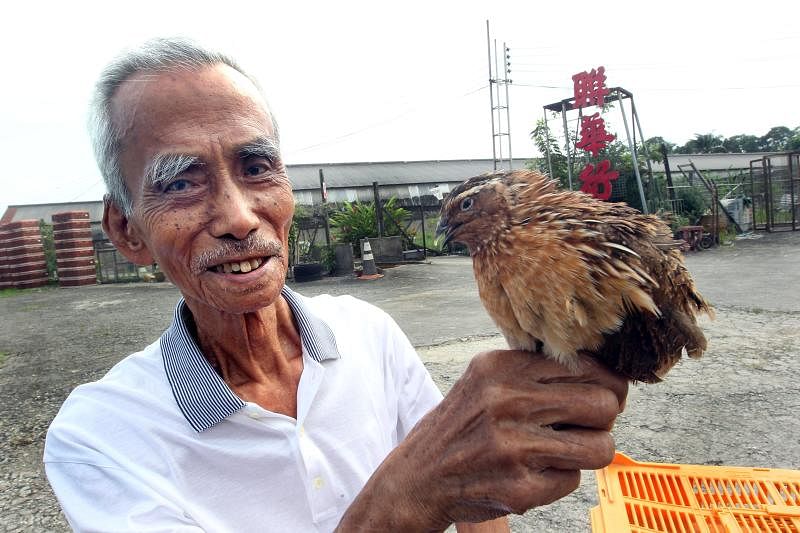Ho Seng Choon, pioneering poultry farmer, dies at 95
Sign up now: Get ST's newsletters delivered to your inbox

Mr Ho Seng Choon is credited with modernising farming techniques over six decades.
PHOTO: ST FILE
SINGAPORE - Pioneering poultry farmer Ho Seng Choon died suddenly last Saturday (Aug 11) at 95, leaving behind a farming legacy that spans 64 years.
He died after suffering breathing difficulties from choking on mucus, according to the youngest of his seven children, Mr William Ho, 52.
Mr Ho, whose Lian Wah Hang Quail and Poultry Farm is one of the oldest surviving farms in Singapore, was, in a way, an accidental farmer.
Born in Fujian province in China, he came to Singapore when he was about 14 years old and was put to work helping in his father's provision shop.
After some years, his father returned to China and left him to run the shop, which he found boring work, according to William. "So he wound that shop up and decided to go to Japan in 1952 to find his future," said William, who now runs the family business.
Mr Ho did not intend to settle in Japan but was on the hunt for a business he could bring back to Singapore. Eventually, he settled on three possibilities: toys, cars and farming.
He ruled out toys because, said William, in post-war Singapore "everyone was hungry and had no money for toys". On the other hand, cars required too much initial capital. That left farming.
"Singapore was developing then and food was a necessity," William said. Sensing an opportunity, Mr Ho brought back modern Japanese poultry rearing methods such as battery cages, a housing system for egg-laying hens.
Initially, he was laughed at by incredulous egg farmers. What birds, so the question went, went into cages except pets?
But he persevered. He rented out a plot of land in Changi, built chicken coops with the Japanese cages and invited farmers to see them. Astounded by how clean and efficient the system was, they began to buy the cages from him. Eventually, he was so successful that he could not supply enough of them to keep up with demand.
Despite the similarity of the name and business, Mr Ho had no connection with local egg producing giant, Seng Choon.
But he was entrepreneurial, with an appetite for risk. He started Lian Wah Hang in 1954, and in the 1960s saw a business partnership fail, ending with his partner taking over the Malaysian chunk of the venture and leaving him with the smaller Singaporean market.
But he never gave up. "We had to think out of the box, so we went out of our comfort zone and tried goats, crocodiles, terrapins - you name it, we had it," said William.
"In the 1980s, my father had a bet with someone to raise a temperate-climate bird in Singapore. So he took up the challenge and started breeding partridges."
It was not easy. Sometimes, 100 chicks in a box would die in a night. But years of experimentation later, he raised thousands of the birds on his farm. "He won that bet," said William with a chuckle. The farm no longer sells partridges and shifted to focus on quail after William took over in the 1990s.
Mr Ho's efforts saw him recognised in various media articles throughout the years - he was featured in a 1990s TV documentary as well as a video by the National Heritage Board.
Even at the age of 90, long after his son had officially taken over Lian Wah Hang, Mr Ho maintained his passion for the business. "He told me that Facebook was a very good way to connect with customers and that we needed to tap social media," said William. "He wanted to use Instagram as well... Most people his age didn't even want to go on a computer."
William said the lesson his father imparted most to him was perseverance. "He taught me that you have to put your heart, your mind into what you do. When you put your heart into your work, you will be rewarded with the fruit of your labour. I've tried the fruit many, many times, and it's very sweet."
Up until the end, Mr Ho was in good health."He was still very sharp, and was planning for future farms," said William. "The night before, he was fine, reading the newspaper and talking like nothing was wrong."
The following morning, William said he went out to deal with some urgent deliveries, and returned to the farm at around lunch time to find his father lying in bed and having difficulty breathing.
He was taken to hospital, but died the same day.
He leaves behind his 90-year-old wife, seven children, and eight grandchildren.
William plans to continue his father's legacy through the farm, even though competition has toughened with a influx of quail eggs from Malaysia.
"If I can continue this farm, that would be best," he said. "If society want us farmers to be around, please voice out for me that Singapore really needs the countryside."


